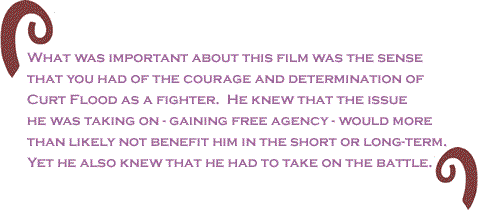|
I
read, with interest, Dr. Anthony Asadullah Samad's piece
"The
Curious Case of Curt Flood: HBO Documentary misses
the point.". Dr. Samad was highly critical
of the documentary, feeling that it tore down Curt Flood
and did not make a case for Flood going into the Baseball
Hall of Fame. With due respect to Dr. Samad, I have
a different take.
I
thought that the documentary was, in many respects, gripping.
It was the story of a fighter. Indeed, it felt almost
Biblical in the sense that Curt Flood went through the trials
of Job. Flood took a principled stand against the
reserve clause, receiving the backing of the Major League
Baseball Players Association (the labor union of the players)
in order to pursue the case. As Dr. Samad points out,
the case went up the Supreme Court where, in an absolute
miscarriage of justice, Flood lost. Flood's personal
decline began during that case, leading to years of alcohol
abuse and depression until, after hitting bottom, he was
able to resurrect himself with the assistance of both his
girl friend at the time as well as, later, the woman who
appears to have been the love of his life, the actress Judy
Pace (who would go on to marry Flood).
Samad
is correct that the documentary does not discuss the efforts
that have been underway for years to get Curt Flood inducted
into the Hall of Fame. I agree with Dr. Samad that
this was an error on the part of the film-makers or perhaps
it was an oversight. But what was important about
this film was the sense that you had of the courage and
determination of Curt Flood as a fighter. He knew
that the issue he was taking on - gaining free agency -
would more than likely not benefit him in the short or long-term.
Yet he also knew that he had to take on the battle.
What the film conveys, at the same time, is that he
may not have realized the toll that the fight would take
on him and the loneliness and alienation that he would experience.
Part of the difficulty that Flood found himself in
was, as the film demonstrates, the result of many of his
friends and former colleagues from baseball leaving him
in isolation. Though the Players Association covered
the costs of the litigation, many of his friends and colleagues
in baseball ignored Flood as if he had the plague out of
fear of retaliation by the owners of Major League baseball.
The famous St. Louis Cardinals' pitcher, Bob Gibson,
who had also been a friend of Flood's, admitted as much
in the documentary.

The
documentary was very hard hitting. It discussed many
of the issues that were raised in Brad Snyder's book on
Curt Flood, A
Well-Paid Slave: Curt Flood's Fight for Free Agency in Professional
Sports , including the
alcoholism, various relationships, as well as the possibility
that he had not been the painter for which he had been regularly
credited (though he was, at least, a capable sketch artist).
None of this, however, detracts from the contributions
made by Curt Flood. It simply places the situation
in a broader context. It helps the viewer of the HBO
documentary get a sense of Curt Flood-as-human being who
descended into the bowels of Hell only to re-emerge like
the mythical phoenix.
, including the
alcoholism, various relationships, as well as the possibility
that he had not been the painter for which he had been regularly
credited (though he was, at least, a capable sketch artist).
None of this, however, detracts from the contributions
made by Curt Flood. It simply places the situation
in a broader context. It helps the viewer of the HBO
documentary get a sense of Curt Flood-as-human being who
descended into the bowels of Hell only to re-emerge like
the mythical phoenix.
Curt
Flood's life was complex. But it was a life that illustrated
the consequences of conduct on many different levels. Flood
took on the bastions of power in Major League Baseball only
to be struck down. Yet had it not been for Curt Flood, along
with Marvin Miller, the Executive Director of the Major
League Baseball Players Association, it is far from clear
when the players would have won the respect that came with
free agency.
For
these reasons i appreciated the HBO documentary. There
are too many sports figures today, let alone sports enthusiasts,
who have not a clue as to who Curt Flood was, and the contributions
that he made in the fight for dignity and justice. Watching
the HBO documentary one got at least a glimpse of that,
a glimpse that will hopefully inspire sports fans to demand
that Curt Flood be inducted into the Hall of Fame due to
the contributions that he made to the sport known as baseball.

BlackCommentator.com Editorial Board member, Bill Fletcher, Jr., is a Senior Scholar
with the Institute
for Policy Studies, the immediate past president of TransAfricaForum and co-author of Solidarity Divided: The Crisis in Organized Labor and a New Path
toward Social Justice (University of California Press), which examines the crisis of organized labor
in the USA. Click here to contact Mr. Fletcher.
|

